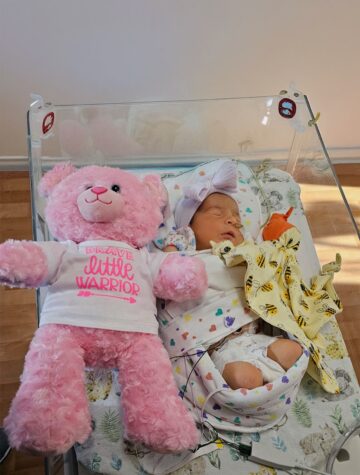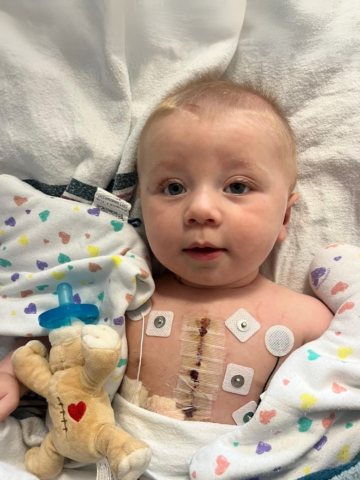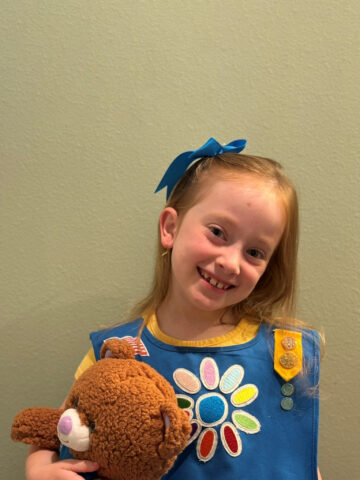By Amy Rogeness, daughter of Dr. David Hicks and mom to Cora and Ellie, recent graduates of CHOC’s Small Baby Unit
My father has been a neonatologist for almost 40 years, so I’ve always known the fear and complications that can arise when babies are born extremely prematurely – I just never imagined this would happen to my own children. Little did I know, I would get to experience firsthand what my dad has been doing his entire career.
Making a game plan
My husband Brian and I experienced infertility and finally got pregnant with the help of a fertility specialist. When we found out we were pregnant with twin girls, we were very surprised to say the least! Since we were having twins, this put my pregnancy in a high-risk category. We knew that we were going to be more closely monitored and that there was a chance the girls could come early, which is common with multiples.
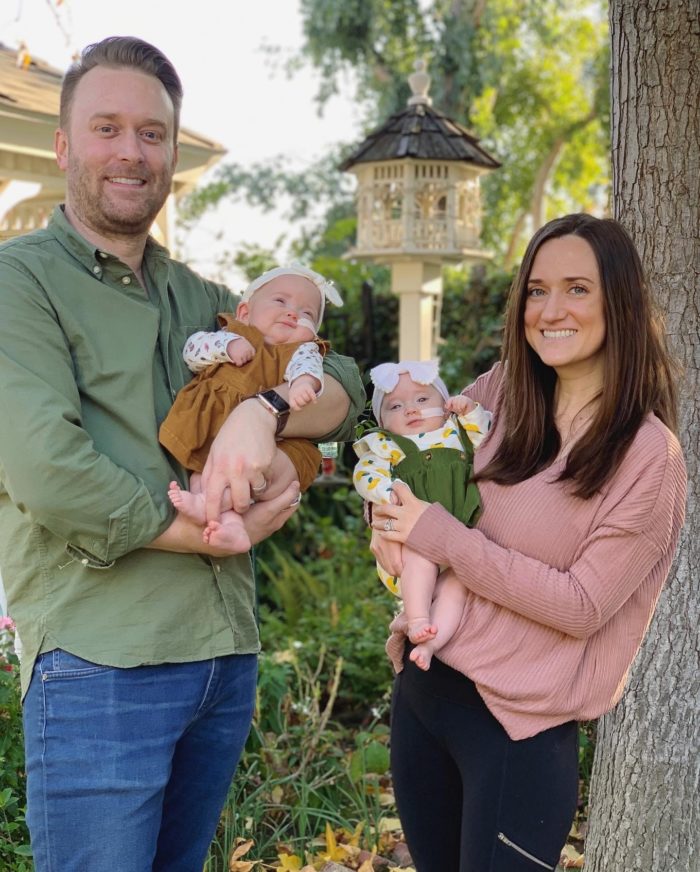
When we were deciding where we wanted to give birth, we based our decision on the hospital’s connection to CHOC. We wanted to know that if our daughters did come early that they would be cared for by the CHOC team. We decided to give birth at St. Joseph Hospital in Orange, knowing they had a CHOC NICU on-site, as well as CHOC’s main campus located right across the street.
22 weeks, 6 days
When I was just shy of 23 weeks pregnant, I attended a routine appointment with my high-risk maternal and fetal specialist. Due to the COVID-19 pandemic, I had to attend all of my appointments alone. During the appointment, the doctor found that I had no measurable cervix and I was actually dilated; I needed to be admitted to the hospital immediately. I will never forget that moment and the whirlwind of emotions not exactly knowing what would happen or what this meant for our girls.
That day, we went through medical intervention to stop any labor from happening as well as a steroid injection protocol to help the girls’ lungs develop in case they did come early. We also had our first meeting with a CHOC neonatologist and discussed what it meant to potentially have a baby at 22 weeks and 6 days. We understood that at this point, any weeks, days or even hours were critical for the girls and their chances of survival.
After 72 hours, I was admitted to the hospital on strict bedrest. We didn’t know if, or when, I would go into labor and they wanted me to be off my feet, and at the hospital, in case anything happened.
24 weeks, 3 days
We made it a week and a half. My due date was August 29, and my daughters were born May 12. I was 24 weeks and 3 days when the girls arrived via emergency c-section. Due to the emergency nature of their birth, I was put under general anesthesia, which meant Brian could not be in the operating room. Therefore, neither of us got to see our girls being born.

In hindsight, I am not sure that we would have wanted to witness what the operating room probably looked like that day. What some people describe as the best day of their lives was actually our worst. We were terrified for our girls. We didn’t know what was going to happen, if they would survive or what state they would be in. The feelings of fear, desperation, sadness and anxiety were indescribable.
Dr. Christine Bixby and Dr. Sudeep Kukreja were the CHOC neonatologists present at my delivery. They intubated Ellie and Cora immediately after they were born and as soon as the girls were stabilized, they were brought to CHOC’s Small Baby Unit – a special part of CHOC’s neonatal intensive care unit (NICU) designed for the smallest and sickest babies. From there, our team that we worked with consistently was comprised of Dr. Kushal Bhakta, medical director of CHOC’s SBU; Dr. Michel Mikhael, a neonatologist; and Dr. Bixby. In addition, Annie Denslow, a physician assistant; and Renee Martinez, a nurse practitioner, were a vital part to the team and incredible sources of information and support. All of our day shift and night shift nurses, as well as our developmental and respiratory therapists, provided excellent care.
The girls were tiny. Cora was 1 pound, 4 ounces and Ellie was 1 pound, 3 ounces. Nurses weighed the girls after they were intubated and stabilized, so those weights are likely inflated by some of the equipment on them at that time. Their actual birth weights were probably closer to 1 pound.
The entire NICU and SBU teams work tirelessly to do everything they can to help babies live, grow, and hopefully thrive — when they should still be in the womb.
Day one of life, day one of complications
Those first 24 hours were incredibly hard. We were not sure if the girls would survive the night because they were so small. But, amazingly, they did, and they continued to fight each day after that.
Those early days were fraught with issues arising due to the girls’ extreme prematurity. Their lungs were so small and sick that they were unable to breathe on their own and needed to be intubated. A small victory came a few weeks later when they were moved to less invasive ventilators. Cora also needed steroids to help her lungs further develop. Each girl had her ups and downs when trying to wean off oxygen support. Eventually they both moved from the ventilator to CPAP, or continuous positive airway pressure. CPAP delivers constant air pressure into a baby’s nose to help the air sacs in the lung stay open and prevent apnea. After a few tries, the girls “graduated” from CPAP to a lower-pressure nasal cannula before being ready to breathe room air.
Additionally, their kidneys weren’t functioning properly. Their urine output greatly decreased, and the levels of potassium rose in their body. The kidneys help process potassium and eliminate it from the body through urination. Due to their decrease in urine output, the higher levels of potassium had the potential to cause heart issues, among other things. The girls were given dopamine to increase the blood flow to the kidneys to help their kidney function return back to normal. Additionally, they were also given a diuretic to help squeeze out the extra fluids, and therefore potassium, from their bodies.
Since the girls were born at 24 weeks and 3 days, at this point in the gestational process a baby’s bone marrow – which creates red blood cells, among other things – isn’t working on its own yet, and it relies on the mother for support. Due to the frequent blood tests needed to monitor their bodily functions, their blood supply quickly diminished. Since they couldn’t produce their own blood, they became anemic and needed numerous blood transfusions. We are so grateful to all those who donate blood!
Cora also developed necrotizing enterocolitis or NEC, an inflammation of the intestines that is common among very premature babies. NEC can become very serious very quickly. Luckily, the SBU team identified it immediately and started her on the treatment protocol which includes antibiotics and IV fluids. Her case turned out to be very minor, but that is thanks to the SBU team for jumping on it quickly and aggressively.
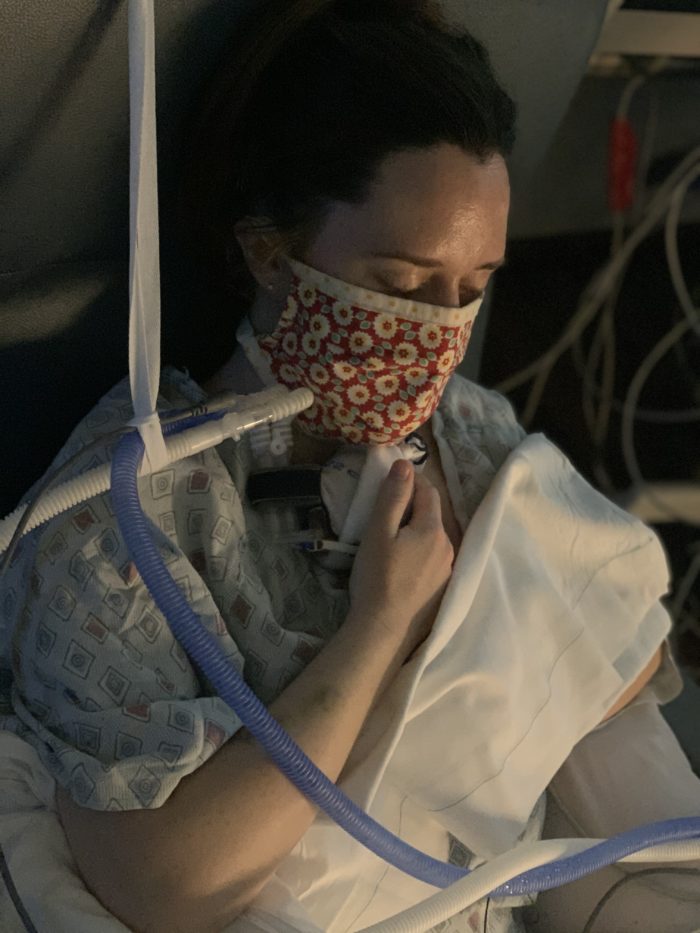
Like living on a rollercoaster
The NICU experience is often described as a rollercoaster, filled with continuous ups and downs. There were so many times where it changed from day to day, especially when the girls were so unstable at the beginning. Oftentimes it felt like one step forward then two steps back.
The NICU experience is nothing like what we imagined when planning to welcome our children into the world. It’s simply not how we pictured the beginning of our life as a family. We had to readjust to everything we thought the experience of having babies would be. We learned to modify our expectations to what our life was now like. We learned it was OK to mourn for what we missed out on and be OK with the journey that we were now on.
When the girls were in the NICU, we visited them every day. In the early days, we would hold them and do skin-to-skin, or kangaroo care, for two to three hours a day. Because they were so incredibly small, it took an entire team of nurses to take our tiny babies out of their isolettes and place them onto our skin. It was incredibly stressful to hold them; holding a 1-pound baby doesn’t feel like much.
Even though we just sat there in those early days holding our tiny babies, we felt exhausted when we left. We were exhausted from the stress, from the emotions, from staring at monitors for hours and watching their vital signs drop. At times, the care team would need to stimulate them in order to get them to breathe again or turn up their oxygen to boost their oxygen saturation levels. Although it was stressful, we were happy to be with them, to hold them, to be reminded that they were real, and to remind them that we were there and fighting for them.
That first month or so the girls’ weight didn’t change much. Their weight gain was slow because they were focused on surviving, not growing. Once the girls began to stabilize, they started gaining weight and started interacting more with the world around them. It began to feel like the girls were real babies, albeit still very small.
Glimpses of normalcy in the NICU
As the girls grew bigger and more stable, our time visiting the girls became less stressful and more enjoyable. We sat with the girls, talked to them, read to them – all the typical things you look forward to when planning to welcome babies into your family.
When we moved to the nasal cannula and to open cribs, things felt much more normal. When we walked into their room, we could immediately see them laying there without much breathing equipment on their face and not laying in a covered isolette. For the first time in their lives, we — with masks on, due to the COVID-19 pandemic — could safely get close to their faces.
Learning in the NICU what other babies learn in the womb
In addition to holding them, we worked with the NICU’s development therapists on exercises for the girls. Their little bodies could get stiff from laying down all day — instead of floating in the amniotic fluid as they should have been doing at that point — so we needed to move their bodies and help them learn what their body feels like.
We also gave the girls massages which was an important part of helping them learn about positive touch. As a baby in the NICU, aside from the times when your parents are holding you, much of the touch can have a negative association — like equipment being adjusted or blood being taken. The massage helped them learn that touch isn’t a bad thing; in fact, touch can feel good. Massages also helped the girls learn about their body — that they have hands, feet, toes, fingers, etc. Babies typically start feeling their body through movement in the amniotic fluid; moving through space, not liquid, doesn’t give that same feeling.
One of the biggest hurdles that we faced in the NICU was oral feeds. A baby really learns how to suck, swallow and breathe —the skills needed to feed — in the third trimester. Cora and Ellie were born before the third trimester, so they never learned these skills in the womb. We had to gradually help them learn— first by giving them a pacifier, then giving taste trials where they sucked on a pacifier while we dripped a small amount of milk into their mouth.
As we moved to breastfeeding, and eventually to a bottle, their feeding moved slowly. The girls were still struggling to eat enough, even though they were working as hard as they could. The girls needed to take their full feeds by mouth before they would be able to get their feeding tube, called a nasogastric or NG tube, removed and be allowed to go home. Ultimately, we made the decision that they would go home with their feeding tubes. The home NG tube program is designed for babies who are close to taking full feeds, but not quite there yet. It allows the babies to go home, versus staying longer in the NICU, where they can be with their parents and in a more normal, relaxed home environment.
Day 136
After 136 days in the NICU, we finally got to bring Cora and Ellie home! We brought them home with only their feeding tubes as support, which is pretty remarkable for ex-24 weekers.
Their feeding tubes were meant to be a short-term bridge as the girls grew bigger, their lungs grew stronger, and they maintained the endurance needed to take full feeds by mouth.

The feeding tubes were another reminder that Cora and Ellie weren’t like “typical” babies, and that we couldn’t fully leave our NICU experience behind. This was another opportunity for us to adjust our expectations of what it is like to have a premature baby. We didn’t expect to have our first few months look like that, but we also didn’t expect to have 24-week twins. The first few years of life for a premature baby are a little different from that of a full-term baby. We have more milestones to look out for and work toward, more doctor’s appointments and follow ups to make sure the girls are doing well. Although not what we expected, we will do whatever we need to in order to help our girls thrive and catch up to their peers, so that eventually they won’t be defined by their prematurity.
It’s been incredible to have the girls at home. The first few days were a whirlwind of an adjustment. After seeing them and participating in their care for 136 days, it was still a shock to actually have babies in the house – nothing can prepare you to have a newborn at home! However, we felt much more confident in caring for them and knowing what they needed because of how involved we were in their care while they were at CHOC. The journey to removing their feedings tubes took a little longer than expected, but we were able to take the tubes out in the middle of December – close to three months after they were discharged.
It feels wonderful to have them with us all the time. We love to hold them, watch them grow, develop, learn new things, and revel in how far we’ve all come together. Having them home is what we dreamed about for 136 days. Although being a new parent and having twins is hard, most days feels like a pinch me moment – we are so thankful for our miracle girls.
A new level of appreciation for my father, a neonatologist
My father was not involved in the care of his granddaughters; he wanted to act as grandpa, not as Dr. Hicks. (You can read more about his career here.) However, that didn’t erase his knowledge of neonatology and his knowledge of what the girls were going through, what needed to happen, or what would or could happen next.

For him, it was hard knowing that his granddaughters were the some of the smallest and sickest babies in CHOC’s care. For Brian and me, it was helpful to have his knowledge. Although the team at CHOC was amazing, it was really helpful and comforting to be able to talk things over with my dad after we came home from the hospital. He would listen to us, hear our concerns, or answer some extra questions we had. It wasn’t that we needed it exactly — the team at CHOC had great explanations and communication — but it just helped to ease some of the constant anxiety and worry we had as parents.
We are extremely grateful for his listening and compassionate ear as we went through our darkest days. It was comforting to know that he was happy with the girls’ care – he knew the team of neonatologists, and he had worked with or trained many of them. He knew the level of care and concern that the team has for preemies, and he never hesitated to have his granddaughters cared for by them. I think it says a lot about the CHOC NICU and SBU that a lifelong neonatologist would feel confident his granddaughters were receiving the best possible care in the hospital where he has spent his entire career. He never wanted them to be anywhere else.
Looking ahead
From day one, CHOC’s SBU team always had the girls’ growth and development top of mind.
After the extremely critical stage of the girls’ earliest days, the treatment plan changed to trying to help the babies grow by properly gaining weight. The team knows that helping the babies gain weight, and grow their brains, will help the babies develop better in the long run.
In addition to weight gain, the SBU experience involved therapy to help the babies develop physically and neurologically. The SBU team always looked at how anything they would do would benefit the girls in the long run. What can we do now to help the 2-year old Ellie and Cora? What can we teach them now that would help them when they start school?
As crazy as that sounds, the team has evidence-based practices that talk about how things babies learn in the NICU can actually help them adjust as they grow older. Not all NICUs provide this type of therapy. CHOC has a team that can do, and does, it all. This means that they take anything and everything into consideration when caring for premature babies.
Their extensive team works together to make sure that all needs and all areas of health are met. They care for the whole patient and try to not only care for their critical health needs, but also ensure that they will have happy, healthy lives in the future. If a parent is in a NICU, or is even thinking about having a “just in case” plan, they need to think about different the types of care that the hospital can provide – we felt like CHOC had it all, and it was the best place for our girls.
Thank you
I cannot thank the SBU team enough. The entire team there — the doctors, nurses, developmental therapists, respiratory therapists and more — are all incredible. From day one, they told us that they would care for the girls like their own children and they did exactly that.
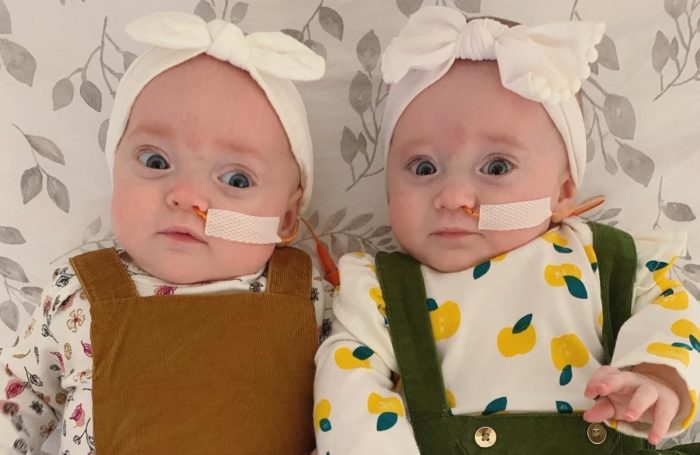
The team was invested in the girls. They cheered them on, commiserated with us during setbacks and always had the girls’ best in mind. The SBU team’s skill, knowledge and commitment to small babies is incredible. They cared amazingly well for our girls — they were always on top of everything, always working to treat this or fight against that.
In addition to their expert care for our girls, the doctors and nurses at CHOC also took care of Brian and I as parents. They helped us survive a four-and-a-half month NICU stay in the midst of a global pandemic. They answered our countless questions, answered our what-if’s, and also helped us cope with our situation. They always asked how we were. They were willing to listen to the emotional struggles that we faced. Sometimes, they coached us through it, other times, they simply lent a shoulder to cry on. I cannot thank them enough for caring for us, too.
No one would ever want, or expect, to have a premature baby, especially an extreme micro preemie. However, a place like CHOC is exactly where you want to be. The highest level of care, the deepest commitment, the passion for caring for the smallest and sickest babies, and the concern for the parents — all of that got us to where we are today. The girls are doing so well because of CHOC’s care and we are infinitely grateful that they saved our girls’ lives.
Get more expert health advice delivered to your inbox monthly by subscribing to the KidsHealth newsletter here.
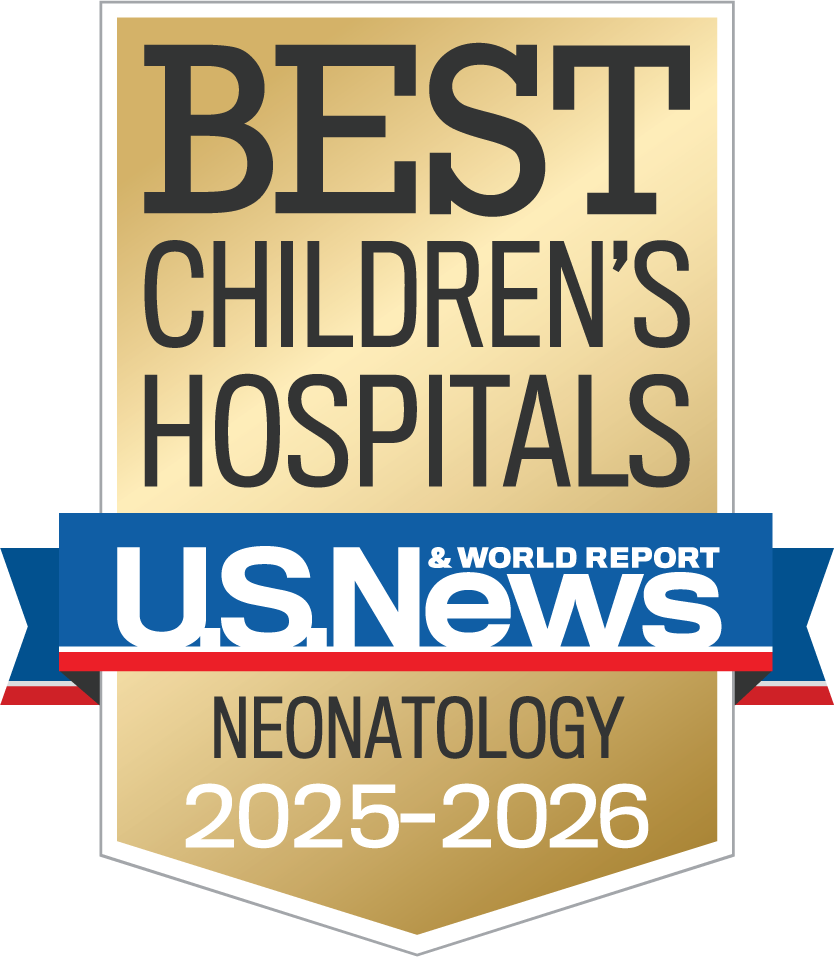
Learn more about CHOC’s Neonatology Services
CHOC Hospital was named one of the nation’s best children’s hospitals by U.S. News & World Report in its 2025-26 Best Children’s Hospitals rankings and ranked in the neonatology specialty.

